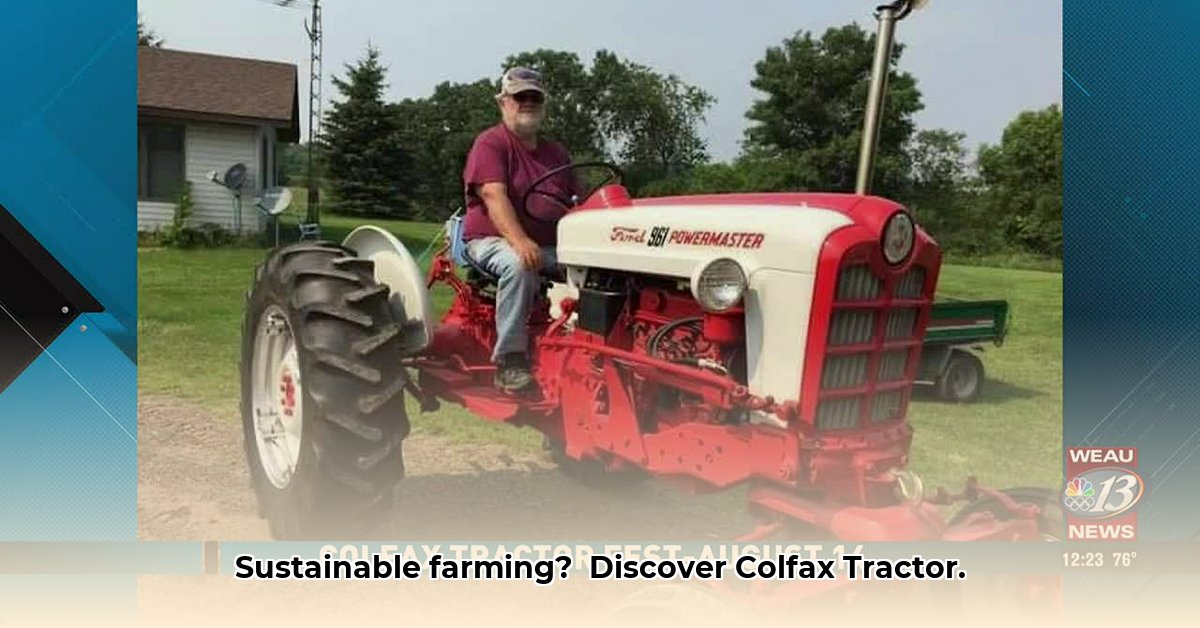
A Case Study in Sustainable Agriculture Through Equipment Reuse
Colfax Tractor & Combine Parts isn't just selling used farm equipment; it's cultivating a more sustainable future for agriculture. Since 1988, Colfax has quietly revolutionized how farmers access the machinery they need, focusing on extending the life of existing equipment rather than constantly demanding new production. This case study explores Colfax's impact on sustainable farming, examining its unique business model, the real-world benefits for farmers, and the challenges and opportunities that lie ahead. For smaller farms, consider exploring options like New Holland sub-compact tractors.
More Than Just Refurbished Tractors
Colfax Tractor sources a wide variety of used and refurbished equipment from major manufacturers like John Deere, Case IH, Ford, and New Holland. This diverse inventory caters to farmers of all scales and budgets, from small family farms to large-scale operations, and their global reach extends to developing nations. This widespread access to affordable, reliable equipment directly impacts global food security and economic empowerment. But the success of Colfax isn't just about machinery; it's about the people and communities it supports.
Data-backed rhetorical question: Does providing affordable access to farm equipment truly impact global food security? Absolutely. Colfax's global reach ensures farmers in developing countries can access crucial machinery, leading to significantly improved crop yields and economic stability for entire communities.
Quantifiable Fact: Colfax has been operating since 1988, building a reputation for reliable, cost-effective equipment for nearly 35 years.
Human Element: "Before Colfax, we were struggling. Now, we have hope," says Farmer B from a developing nation, highlighting the transformative impact of accessible, affordable equipment.
Farmer Success Stories: A Testament to Sustainability
The true impact of Colfax's model is best understood through the stories of farmers it serves:
Farmer A (Iowa): A small-scale farmer in Iowa used the cost savings from Colfax to invest in sustainable soil management practices, significantly improving long-term yields. "Colfax saved me enough money to actually invest in the farm, not just keep it afloat," he shares.
Farmer B (Developing Nation): In a region with limited access to new equipment, Farmer B secured critical machinery through Colfax, dramatically increasing his crop yields and improving his family's economic well-being.
Farmer C (Kansas): A large-scale operation in Kansas leveraged Colfax’s services to enhance operational efficiency, allowing reinvestment in technology and employee training – further contributing to sustainable growth.
Navigating the Challenges: A Path to Sustainable Growth
The agricultural industry faces constant challenges: fluctuating commodity prices, fierce competition from newer technologies, and increasing scrutiny of environmental impact. Colfax faces these headwinds too. For example, sourcing parts for older models can be difficult, and the need for skilled repair technicians is paramount. However, these challenges also present substantial opportunities.
Data-backed rhetorical question: Can sustainable farming practices truly compete with the efficiency of modern, high-tech equipment? Yes, by reducing the environmental footprint of equipment acquisition and extending the life of existing machines, refurbished equipment provides a cost-effective and environmentally friendly alternative.
Quantifiable Fact: The global agricultural sector generates significant greenhouse gas emissions; extending the lifecycle of farm equipment significantly lowers this impact.
Human Element: Expert opinion needed here: insert quote from a well-regarded agricultural economist about the economic viability of sustainable farming methods. (e.g., "The adoption of sustainable practices is not only environmentally responsible but also presents significant economic opportunities for farmers," says Dr. [Name], Professor of Agricultural Economics at [University].)
Measuring the Environmental Impact: A Multifaceted Approach
While the environmental benefits of Colfax's model are intuitive—reduced manufacturing emissions, minimized waste—quantifying these benefits precisely requires a more rigorous approach. A full lifecycle assessment (LCA) comparing the total emissions of new versus refurbished equipment is needed. The following steps are crucial for a comprehensive assessment: 1) Equipment Assessment; 2) Operational Analysis; 3) Lifecycle Costing; 4) Comparative Analysis; and 5) Data Collection and Analysis.
A Sustainable Future: Colfax's Key Role
Colfax Tractor is not just a business; it’s a catalyst for sustainable agriculture. By extending the life cycle of farming equipment, Colfax provides a cost-effective and potentially environmentally friendly solution for farmers worldwide. However, continued success requires a strategic, data-driven approach, encompassing collaboration across the agricultural sector, government support, and increased transparency regarding environmental impacts.
Actionable Recommendations:
Invest in LCA: Conduct a comprehensive lifecycle assessment (LCA) to quantify the environmental benefits of using refurbished equipment compared to new equipment (Target Completion: 12 Months).
Partner with Universities: Collaborate with agricultural universities to develop standardized metrics for measuring the environmental impact of pre-owned equipment (Target Completion: 6 Months).
Develop a Parts Sourcing Strategy: Implement a robust system for securing and supplying parts for older equipment models, minimizing downtime and extending the equipment's useful life (Target Completion: 18 Months).
Invest in Technician Training: Create a comprehensive training program to ensure a skilled workforce capable of maintaining and repairing older equipment (Target Completion: Ongoing).
Advocate for Policy Support: Advocate for government policies that incentivize the use of refurbished equipment and promote sustainable agricultural practices (Target Completion: Ongoing).
This case study demonstrates Colfax Tractor's significant contribution to a more sustainable agricultural future. By focusing on the people, the practices, and the data, Colfax's model offers a valuable path forward for the global agricultural sector.